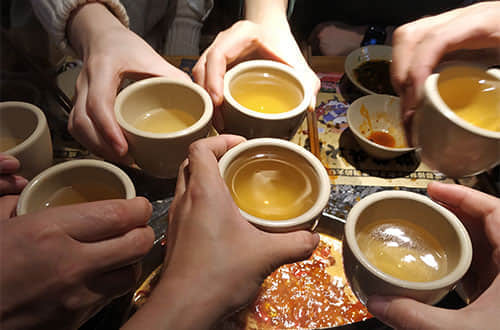KTV in China

What is a KTV

KTV is “Karaoke”, the Japanese term used in the West for someone singing popular songs to the instrumental audio track. The word “Karaoke” will not be used in China; instead, you’ll see the three neon-emblazoned letters “KTV” (one of the few times you’ll ever seen Roman letters used in China).
KTV’s are standalone businesses, with the larger ones occupying entire floors in buildings while smaller ones will occupy a section of a floor. They are located in multiple areas across every city. Inside, a KTV is set up with a reception, a simple restaurant/convenience store, (usually) one large group room, and many private rooms of varying sizes.
Private rooms are usually elaborately decorated with bright, neon designs and large LED flat screens (often multiple screens covering entire walls). Lightening inside is usually pleasant, indirect, colored lights. For those who have never been inside such a room, it can seem straight out of a futuristic Hollywood movie.
Cultural Popularity
While Karaoke is mostly a niche novelty in the West, it’s one of the most popular nighttime activities in China and if you’re ever invited to a dinner or evening get-together, there’s a good chance you’ll end up being invited to a KTV later. If this has not typically been your type of scene back home, it’s a good idea to give it a try at least while in China. There aren’t many more popular cultural entertainment activities than this so it gives visitors, at the minimum, a good peak into typical Chinese life. Besides, it might even be a lot of fun! Many Chinese who enjoy KTVs go there because they can actually sing pretty well so if you’re lucky, you might get treated to a real vocal performance.
Interesting Cultural Note – Time to let loose! For anyone salivating to see how the otherwise conservative Chinese culture finally kicks back and gets “wild”, there’s few better opportunities than at a KTV. The party inside might not fit one’s definition of “wild” back home, but KTVs are one of the few places where the Chinese feel comfortable enough to really let loose.
How it Works
KTV’s are a labyrinth of private rooms of varying size with possibly one large group room. Most people rent a private room that will hold varying amounts of people, but around 10 is a fairly common size. Inside the rooms, there are comfortable couches, chairs, some tables, maybe a small sink or kitchenette, and possibly a small fridge. The focal point of the room is of course the TV with preloaded songs. The rooms are rented for an amount of time. Food and drinks can be ordered and delivered to the room and an attendant will come around to see if the group would like to order anything else. Beverages include alcoholic and non-alcoholic drinks. Food is usually snacks – which can be nicely arranged vegetable platters or packages of chicken feet (a popular snack in China).
The room is paid for ahead of time and consumption is paid for when you’re ready to leave. If invited by someone else, they will probably pay for everything themselves; however, it’s polite to offer to split the bill or pay your part. Sometimes your offer will be accepted, but often it won’t. In such case, just enjoy the evening and be grateful to your hosts for showing you how they enjoy partying the night away.
Additional KTV Activities in China

KTV Games
While this may seem rude in the West, don’t be surprised if you see people in your room playing games while others are singing. In China, it’s quite common for those who aren’t singing to: play dice (you may want to inquire about the rules with your KTV friends before playing); play truth or dare; or play a variety of drinking games (some may be similar to those in the West, but may have different rules or customs).
Hotpot in KTV
Some KTV’s offer a mini “Hot Pot” service in private rooms. “Hot Pot” is a soupy, fondue style meal where customers dip fresh meat and vegetables into boiling hot soup. This style of eating is quite popular around China, with old and young alike.
Prices
Prices vary depending on the features and style of the KTV. Some are brand new, glittering modern marvels, and others are somewhat dingy and outdated.
Typically, KTV’s charge per person and per hour with private rooms needing a minimum number of people – usually 3-4; however, sometimes the price is for the entire room per hour with bigger rooms going for more. If you don’t have the minimum for a private room, then you’ll need to find a KTV that offers group rooms, which most but not all do.
Per person prices can be $5 - $15 USD per hour. Per room prices can be $15 - $50 USD per hour. Snacks (vegetable or meat trays, for example) will go for $5 - $10 USD with beer selling for $15-$50 USD per 12-pack. In general, each person should expect to pay $20-$50 USD for a 2-3 hr evening or $40-$100 USD each for a 4-5 hr evening in an upper-class establishment.
As in movie theaters or amusement parks, food and beverage prices are much higher inside a KTV. Bringing in food from outside is prohibited, but personal bags are never searched. However, trying to sneak in food or drinks may be frowned upon by your group, or encouraged – it all depends on the group.
There is one way to reduce the cost of going to a KTV, which requires visitors to go online and purchase tickets or package deals (room + food + drink) at a discount. However, the KTV online site will nearly always be exclusively in Mandarin and you may need a Chinese bank or credit card, or a Chinese social media account (like WeChat) in order to pay. The discounts run around 20-40% on average. Most foreign travelers would need the assistance of a Chinese resident to use the online discount sites.
What Kind of Music?
Foreigners unfamiliar with KTVs may be quite surprised to find how many English songs are on the playlist. Modern, classics, lots of 80’s music – the selection may not be as extensive as back home, but there will be 100’s of choices.
The main types of English songs that you won’t find will be from niche bands/singers that are outside the mainstream. If it doesn’t get played much in China, it won’t be in the KTV. This means there’s a lot of 80’s (think Michael Jackson, Air Supply), some 70’s (guaranteed to find John Denver’s “Country Roads” … guaranteed), and some 90’s/2000’s/2010’s (Britney Spears, Beyoncé, Shaggy).
Foreigners may also be surprised to see how many Chinese people can sing so many English songs word-for-word. When people from completely different parts of the Earth are in one room singing the same song word-for-word, it makes the experience quite special.
Something else you won’t find on the playlist are songs in other Western languages like Spanish or French. You might find an occasional Shakira song, but don’t expect much in these genres. Korean and Japanese songs are quite popular and in the south you’ll find a lot of songs in Cantonese.
Guidelines
* Don’t hog the mic.
* Don’t show frustration when people sing non-English songs.
* Don’t joke about those who can’t sing well.
* Relax and have fun.
Nuisances
The biggest nuisance reported by foreigners is cigarette smoke. Smoking is permitted and popular inside nearly every KTV and while most people smoke only in their private room, there is still noticeable smoke in the hallways and bathrooms. Your own private room may however be mostly smoke free if you’re with a non-smoking group. Those with allergies, extreme sensitivities to cigarette smoke, or asthma may want to avoid going or have a backup plan for the evening.
The Development of the KTV in China - The New KTV

Mini KTV
Outside some shopping malls, movie theaters, or other places where many people with congregate, you may see mini, sound-proof Karaoke kiosks/booths only a few square feet (or meters) big. Growing in popularity with the young generation, these are similar to 1-minute photo booths. They make for a fun break or easy activity for when watching a movie is just too inactive. Each kiosk usually has two tall stools, a pair of headphones, and microphones. If you want to try these, the main drawback for travelers is that most only accept Chinese forms of payment such as WeChat pay or Alipay, but double check to see if there are other forms of accepted payment.
KTV Apps
Singing Karaoke is such a popular activity, there are even apps for it – loosely named “KTV apps”. For those interested in experiencing Chinese KTV on their phones, there are two recommended apps you can download (however, please note that as of this writing, neither could be accessed via Google play and both are in Chinese only) – KuGou (酷狗) and Changba (唱吧). These apps allow users to share recordings with friends, compete with others, and offer voice editing.


 Why do Chinese people always talk so loudly?
Why do Chinese people always talk so loudly?  Ganbei (Bottoms up) - Chinese Drinking Culture
Ganbei (Bottoms up) - Chinese Drinking Culture  Popular Sports in China
Popular Sports in China  In China, Who Pays?
In China, Who Pays?